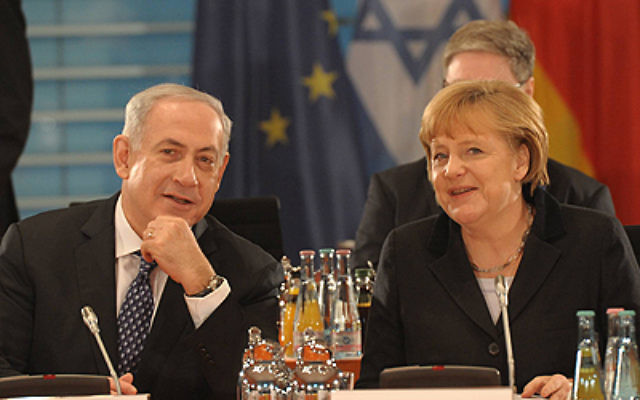Deep Ties Between Israel, Germany Power Sub Deal
Bilateral trade between Germany and Israel help foster cooperation and boost military edge within country.

German newspaper Der Spiegel reported this month that Germany approved a deal to provide Israel with three nuclear-capable submarines. The $1.5 billion transaction, should it go through, will boost Israel’s nuclear-capable submarine fleet from five to eight.
This deal represents a long-lasting diplomatic, strategic, scientific and financial relationship between Israel and Germany. The partnership finds its roots in a controversial 1952 reparations agreement, under which West Germany paid Israel in excess of $10 billion as compensation for Nazi persecution of Jews and confiscation of their property.
At the time, Israel was enmeshed in an economic recession and living under strict austerity measures imposed by David Ben-Gurion’s Labor government.
Despite providing a necessary injection of capital, reparations were not universally accepted by Israelis. Menachem Begin, the leader of the opposition Herut party, staunchly opposed reparations for ideological reasons.
In the end, however, despite the loudly expressed disapproval of Begin and thousands of protesters, the Knesset voted to accept the reparations.
These funds played an important role in stabilizing Israel’s fledgling economy and helping build necessary water and transportation infrastructure. Likewise, catalyzed by the reparations deal, Israel began in the 1950s to develop strong economic, diplomatic and strategic ties with West Germany.
In 1959, the year that Israeli austerity measures ended, West Germany began to supply the young Jewish state with much-needed military technology. Then, in 1961, young Germans and Israelis began participating in annual volunteer exchange programs to support social services in the two countries.
In the early 1960s, with relative caution, Israel likewise warmed up to the idea of elevated and official cooperation with West Germany. On May 12, 1965, the two states exchanged notes establishing official diplomatic relations, marking the official beginning of a long, mutually beneficial relationship.
While military exchanges have played a role in this relationship until today, scientific exchange programs have been central in the interactions between Israel and Germany since 1961.
Today, as part of Mashav, Israel’s Agency for International Development Cooperation, scientific exchanges with the purpose of developing technology to assist the developing world are commonplace, in addition to other programs. Within this framework, many graduate students from German universities study in top-tier Israeli universities to learn about advanced technologies in arid agriculture and water management.
Today, bilateral trade between Israel and Germany is worth billions of dollars annually, and military, social and scientific relations are thriving. The sale of the nuclear-capable submarines, giving Israel a further qualitative military edge in the Middle East, is part of a long-lasting relationship that does not seem be in any danger of weakening.
Eli Sperling is the Israel specialist and assistant program coordinator for the Center for Israel Education (www.israeled.org).
For Further Reading



comments